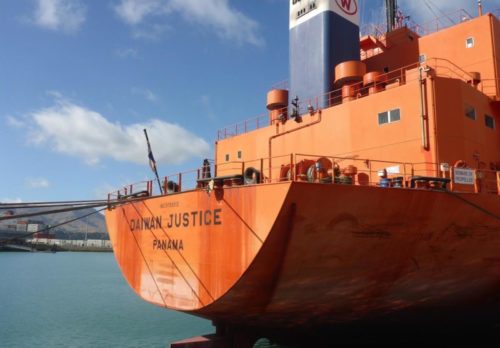
Maritime authorities in New Zealand have detained the bulk carrier Daiwan Justice after learning that the crews’ wages had not been paid for almost four months.
Responding to tip from the International Transport Workers’ Federation, the Panama-flagged vessel was detained by officers with the Maritime NZ on Saturday, 2 March 2019, at Lyttelton.
Maritime NZ Southern Regional Compliance Manager Michael Vredenburg said the detention was lifted later in the day after the ship’s operator, the Taiwanese company Wisdom Marine International Limited, paid the crew.
Last year, Daiwan Fortune, another Wisdom Marine International ship, was also detained for similar reasons. Vredenburg said Maritime NZ is now considering what actions could be taken against the company.
Maritime NZ detained the ship under the Maritime Labour Convention (MLC 2006), which sets out minimum standards for the health, safety and welfare of seafarers, including conditions of employment. It also has provisions for complaints and investigations.
“We acted on information provided to us by the International Transport Workers’ Federation,” said Vredenburg.
According to Maritime NZ, a Maritime Officer went on board the vessel to investigate, conducting interviews with the ship’s master and crew, inspecting documents, and gathering other evidence that the crew had not been paid. When confronted with the evidence, the ship’s master admitted the wages had not been paid and the vessel was detained immediately.
“Maritime NZ applies maritime law irrespective of the ‘flag’ of the ship and the nationality of the crew,” Vredenburg said.
Foreign-flag vessels must at all times comply with international conventions that New Zealand is party to, and in New Zealand waters within 12 nautical miles (22 km) of the coast, must also comply with the Maritime Transport Act.
New Zealand is one of 20 Asia-Pacific countries that participates in the “Tokyo MOU” on Port State Control (PSC). The PSC system, one of several around the world, ensures foreign ships coming to ports can be inspected to ensure they comply with minimum safety, security and environmental protection requirements set down in international conventions, including the MLC.
Copyright Ships & Ports Ltd. Permission to use quotations from this article is granted subject to appropriate credit given to www.shipsandports.com.ng as the source.
